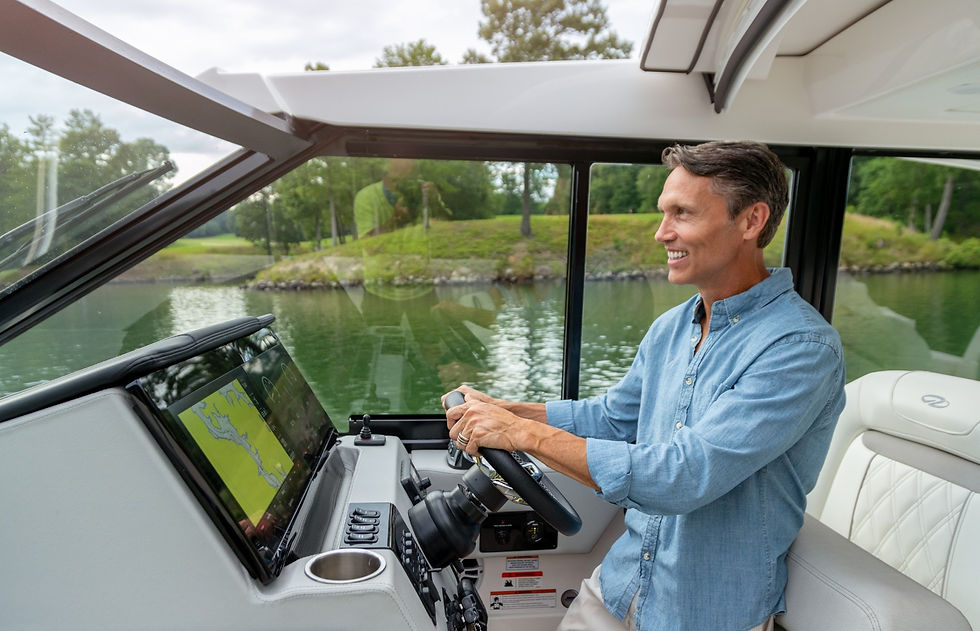
Jan 29

Nov 21, 2024
Updated: May 16, 2022
By: Bill Jennings

Can you answer each question correctly, and do you know why?
This is a definite “false." My GPS operates flawlessly, until some point when I need it most, and then --the dreaded 'Blackscreen.' And don't forget those times when the whole GPS system itself is shut down for repairs and updates. Even sunspots can cause deflection errors in GPS readings. A compass, whether it is a standard magnetic or an electronic 'fluxgate,' is an easy heading fix for reference points that you are aware of (i.e., “I know that the magnetic heading from this marker to home port, is 267 degrees.”). Whether helping you navigate a route on a chart, or just getting you home, a compass is still an important boating tool.
Answer: False, obviously.
Not necessarily. Everybody knows that plastic products last for a long time, so in the 60's, when fiberglass became a viable alternative to wooden boats most boaters opted for plastic over wood. Fiberglass boats are now so prevalent that wooden boats are rare. But wood rot is basically a problem from years past because pressure treating makes wood a practical alternative once again. Pressure treated wood is injected with two main types of chemicals and pound for pound those wood products are stronger than synthetic core materials and are easier to work with. With today's wood offered in differing weights and flexibility, it is still routinely used by many high end yacht builders. Answer: False... mostly.
It is surprisingly easy for any boat to become unstable and take on water. There does not have to be something exceptionally heavy in the boat to cause problems. The further unbalanced materials and people are located from your boat's center of gravity and center of buoyancy, the lower the stability and the higher the risk. Unless a boat is loaded correctly, it can list and take on water. Just look at the giant ship carrying new cars that rolled over, just off the Georgia State coastline. Then there was the tragedy where four sports celebrities backed down to raise their anchor and the boat went down stern first.
Answer: False.
Early 2-stroke outboards wasted fuel and were not environmentally friendly. Because 4-stroke engine designs were more efficient than 2-stroke, when corporate emission regulations stiffened up, outboard motor makers began a fast effort to build and offer 4-stoke outboards in their power mix. But hitting that piston with an explosive charge every time it stopped at the top of a cylinder is bound to produce more power than hitting it every second time. Seeking the best of both worlds, engineers decided to build a 2-stroke that injected into the cylinder the exact amount of fuel that the spark plug could burn. The result is the high-tech 2 stroke direct fuel injection outboards of today. These 2-stroke outboards are both efficient and fast. You will have to study the full list of features and benefits of each, to decide which one is best for you.
Answer: False.
Living on a boat can be too much of a change for some people. Yet depending on circumstances it can be a welcome experience and fabulous lifestyle. I have several friends that live full time on their boat and they love it. Even one who
includes Ontario winters by “bubbling” his boat. People who buy a house first can get caught up in the economics of traditional living and never find the time or money for the boat they always wanted. Buying a boat to live on gives them the boat they want and they can save over time for a fixed home. Those with the most success with boat living are usually single, youngish, and able to thrive in a different environment.
Answer: True.
You can't say that this is true because many large boats are very easy to maneuver with the help of multiple engines and a bow thruster. Almost any twin-screw boat is easier to handle than a single-engine boat. And with today's joy stick controls, you can slip a boat into a space that may be only a foot larger than your boat.
Answer: False.
If you think about it, boats are quite easy to steal. In fact, the high number of boat thefts every year would astound you. Gangs quickly pull them from marinas to sell in different geographic locations, and boats left in driveways on their trailer can disappear in a heartbeat. Less than one in ten stolen boats are recovered, so check that your insurance policy has you covered. Equally important, always have a strong lock on your boat trailer and if you keep your boat in the water install a personal electric disconnect.
Answer: True.
A regular life jacket offers the benefit of a pad behind your neck that keeps your head afloat when you are in the water, but they are bulky and uncomfortable. Along came 'personal flotation devices' or PFD's. Not as good at saving you, but a little more comfortable and very popular. But now we have inflatable life-jackets that sit comfortably on your shoulders and flex with you as you move. Like the airbag in your car, an inflatable vest can pop-up quickly to save you. So if you can afford a boat, you can afford a few extra dollars for a life jacket that is both safe and comfortable for the whole time you spend in the boat.
Answer: True.
Disagree with any of these answers? Comment below and let us know if you think there's more to consider.



Komentar